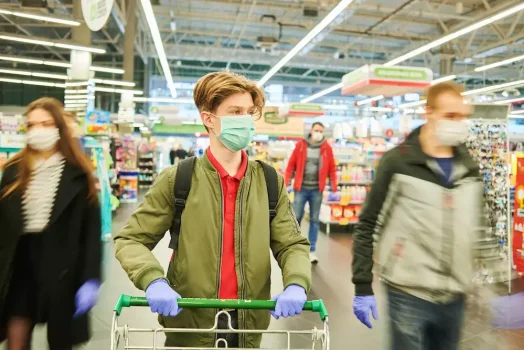Although it’s been over two years now since the COVID-19 pandemic first began, the toll it has taken on our mental health is becoming increasingly evident. Depression and anxiety rates have been soaring, and it’s not hard to see why.
For those of us who have lost loved ones to the virus, the grief can be overwhelming. Trying to grapple with the fact that our loved ones are gone forever is already a daunting task, made even more difficult by the fact that the virus is still circulating and many people are still at risk of experiencing serious cases. Many of us who may be elderly or immunocompromised weren’t even able to gather to mourn our losses together during the worst parts of the pandemic. We were left to grieve in isolation, which can amplify the feelings of loneliness and despair and leave us grappling with the emotions for years to come.
For survivors of the virus, the physical and mental health impacts can also be devastating. Many have been left with chronic fatigue, brain fog, and other health problems that make it hard to function on a day-to-day basis. The emotional toll can be just as hard to bear, as survivors often feel guilty for being alive when so many others have died.
And then there are those of us who lost our jobs or businesses due to the pandemic. While some of us may have moved on and recovered from lost jobs or begun new ventures, the financial insecurity was crippling for many and the consequences of those financial setbacks are still being felt. In addition to the financial hardships, feelings of failure and worthlessness can be overwhelming.
All of this is to say that if you’re still struggling right now, you are not alone. Millions of people are dealing with the same thing. But it’s important to remember that there is hope. Things are and will continue to get better, and we will get through this.
Signs to Watch For
If you or someone you know is having a hard time, it’s important to get help. Some signs that someone may be struggling with their mental health include:
- Changes in sleep patterns
- Changes in appetite
- Loss of interest in activities that used to bring them joy
- Withdrawing from friends and family
- Feeling hopeless or helpless
- Excessive worry or anxiety
- Anger or irritability
- Risky behaviors
If you see these signs in yourself or someone you love, don’t hesitate to reach out for help. There are many resources available to you.
Your primary care doctor can be a good place to start. They can screen for depression and anxiety and can refer you to a mental health specialist if necessary. There are also many hotlines available if you need to talk to someone right away (the National Suicide Prevention Lifeline is available 24/7 at 1-800-273-8255).
If you’re not sure where to start, there are online resources available as well. The website MentalHealth.gov has a list of resources for mental health care. It’s important to remember that you’re not alone in this. Many people are struggling right now and there is help available.
What You Can Do to Help
Here are 4 ways to fight anxiety and depression during the pandemic and onward:
1. Get plenty of sleep:
Sleep is incredibly important for both your physical and mental health. Getting enough sleep and having a regular sleeping time can help improve your mood, increase your energy levels, and reduce stress and anxiety. Make sure to establish a regular sleep schedule and stick to it as much as possible.
2. Eat healthy foods and avoid processed foods:
What you eat can have a big impact on your mood and mental health. Eating plenty of fresh fruits and vegetables, whole grains, and lean protein can help improve your mood and reduce anxiety and depression. Avoid processed foods, sugary foods, and caffeine, which can all contribute to anxiety and depression.
3. Exercise regularly:
An exercise routine is a great way to reduce stress and improve your mood. It can also help structure your day, improve your sleep quality, and produce endorphins that will help combat negative feelings. Even just a moderate amount of exercise can have a positive impact.
4. Spend time with loved ones and friends, even if it’s just virtually:
Socializing and spending time with loved ones can help improve your mood and reduce stress and anxiety. Even if you can’t be physically present with them, staying connected virtually can still be beneficial. Thankfully, there are more ways than ever to stay connected with loved ones. Talking on the phone, video chatting, and doing simple activities like watching the same show or movie can help fight feelings of loneliness and deepen our bonds with our loved ones.








